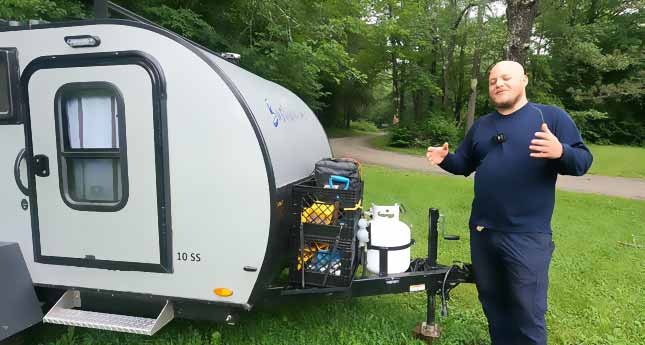Last Updated on March 22, 2022
If you own a trailer, you’re probably familiar with “tongue weight.” But did you know that the tongue weight on a travel trailer can significantly impact its stability?
When a trailer is loaded with too much tongue weight, it will sway and eventually tip over, rendering it dangerous to tow. A trailer’s tongue can be damaged if the weight is excessive. Too much weight can cause the tongue to become stressed.
Knowing the parameters of how to reduce tongue weight on a trailer can be highly beneficial for anyone who owns or operates one.
There are several steps to follow to reduce the tongue weight on a travel trailer. This article will guide you through each of those steps.
What is Trailer Tongue Weight?
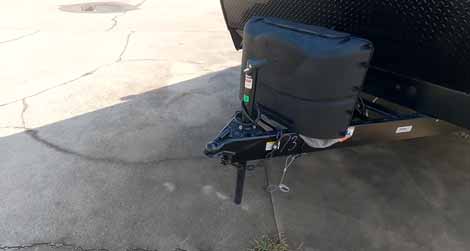
The tongue weight of an RV is the downward force exerted on the trailer coupler’s hitch ball. This weight keeps the travel trailer from fishtailing or swinging from side to side while you’re driving.
An RV tongue weight measurement indicates the maximum force applied to the trailer hitch before it becomes unstable. It’s essential to have enough tongue weight, so the trailer stays put, but not too much, or it will be difficult to control and cause accidents.
Factors that Affect Trailer Tongue Weight
There are several factors that will affect the tongue weight of a trailer, including:
- The weight of the cargo being hauled
- How the load is distributed in the trailer
- The height of the hitch ball above the ground
- The design of the trailer
- The weight of the tow vehicle
Why is it Important to Reduce Trailer Tongue Weight?
If the tongue weight on a travel trailer is too heavy, it can cause the trailer to sway and eventually tip over. This is dangerous for both the tow vehicle driver and anyone else who might be nearby.
In addition, excessive tongue weight can damage the travel trailer and the vehicle’s hitch. There are some other reasons you should reduce the tongue weight of a trailer:
01. Easy to Control: A trailer with less tongue weight is easier to handle. This is especially important when driving in windy conditions or on uneven roads.
02. Safety: As mentioned above, reducing tongue weight can help prevent accidents. This can also help reduce the risk of damage to your vehicle and trailer.
03. Damage Prevention: Excessive tongue weight can damage both the trailer and the hitch on the tow vehicle. Reducing tongue weight can help prevent this damage.
04. Cost Savings: Replacing a damaged trailer or hitch can be costly. By reducing the tongue weight, you can save yourself money in the long run.
How to Reduce Tongue Weight on a Trailer?
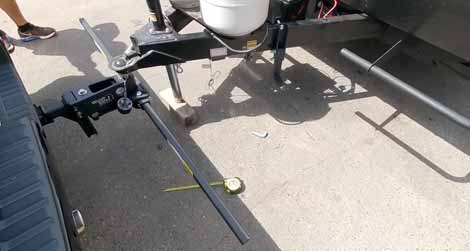
Excessive weight on the tongue of your trailer can cause serious problems. Also, this can lead to wear and tear on your trailer tongue.
Here are some steps to follow, you can reduce tongue weight on a trailer:
Step 01. Measure the Tongue Weight
The first step is to measure the tongue weight of your trailer. This will help you determine how much weight needs to be removed. You can use a bathroom scale or a scale designed for weighing trailers to do this.
Step 02. Remove Excess Cargo
If the tongue weight is too heavy, you’ll need to remove some of the cargo from the trailer. Alternatively, you can re-distribute the weight of the items inside the trailer by removing items from it.
Step 03. Determine the “60% Goes to Front” Rule
The next step is to determine the “60% Goes to Front” rule. This rule states that 60% of the trailer’s weight should be allocated to the front of the trailer. You can use this rule to help you distribute the weight of the cargo more evenly.
Step 04. Adjust the Height of the Hitch Ball
Bringing the height of your hitch ball to a certain level will allow you to reduce the weight of your tow vehicle and make it easier to tow level. This is an important area to work on to decrease your tongue weight.
If you’re still having trouble reducing the tongue weight, you can try adjusting the height of the hitch ball. This can be done by either raising or lowering the hitch ball.
Step 05. Don’t Miss the Rating of the Weight Capacity
The manufacturer usually recommends a gross vehicle weight rating. Therefore, you should never exceed those ratings when forcing your trailer hitch to tow a trailer.
Tongue weight should never exceed the weight capacity of the trailer. Be sure to check the payload capacity rating before you begin towing. This will ensure that you’re within the safe limits for tongue weight.
It’s OK if you choose to improve your vehicle’s towing capabilities by purchasing a powerful weight distribution hitch. Still, it’s okay if you decide to upgrade your vehicle’s towing capacity.
Step 06. Use a Weight-Distributing Hitch
If you’re still having trouble reducing the tongue weight, you can try using a weight-distributing hitch. This type of hitch helps distribute the trailer’s weight more evenly. Weight-distributing hitches are available at most automotive stores.
There you have it. You can reduce the tongue weight of your trailer by following a few simple steps. By following these tips, you can make your tow vehicle and trailer safer and help prevent damage to both vehicles.
Tips for Keeping the Tongue Weight Down on a Trailer
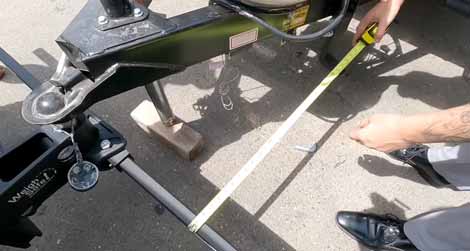
Reducing trailer tongue weight is essential for safety and preventing damage to your vehicle and trailer. Here are a few tips to help you keep the tongue weight down on your trailer:
01. Distribute the Weight Evenly:
One of the best ways to reduce tongue weight is distributing the weight evenly. You can do this by placing heavy items in the middle of the trailer and lighter items towards the front and back.
Weight distribution can be tricky, so it’s essential to take your time and make sure the weight is distributed evenly. You can either follow the “60% Goes to Front” rule or use a weight-distributing hitch.
02. Use a Weight-Distributing Hitch:
If you’re still having trouble reducing tongue weight, you can try using a weight-distributing hitch. This type of hitch helps distribute the trailer’s weight more evenly.
Moreover, it can also help prevent damage to your vehicle and trailer. Weight-distributing hitches are available at most automotive stores.
03. Remove Excess Cargo:
If the tongue weight is too heavy, you’ll need to remove some of the cargo from the trailer. You can do this by removing items from the trailer or redistributing the weight of the items inside the trailer.
04. Consider the Weight Carrying Capacity:
Before you hit the road, it’s essential to consider the weight carrying capacity of your vehicle and trailer. Ensure you’re not overloading your vehicle or trailer with too much cargo. This can lead to unsafe driving conditions and damage your vehicle and trailer.
05. Consider the Trailer Axle Placement:
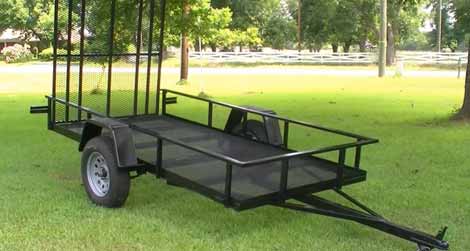
The placement of the trailer axle can affect tongue weight. If it’s too far forward, it can cause the tongue to be too heavy. Conversely, if it’s too far back, it can cause the trailer to be unstable. Therefore, it’s important to place the rear axle in the correct position.
06. Use Proper Hitches and Couplers:
It’s also essential to use the proper hitches and couplers when attaching your trailer to your vehicle. Make sure the hitch is properly rated for the weight of your trailer. Also, make sure the coupler is properly secured to the ball mount.
07. Determine the Height of the Hitch:
If you’re still having trouble reducing tongue weight, you can try adjusting the height of the hitch ball. This can be done by either raising or lowering the hitch ball.
08. Use Proper Towing Techniques:
When towing a trailer, it’s essential to use proper towing techniques. This includes maintaining a safe following distance, using the appropriate turn signals, and coming to a complete stop before making a turn.
By following these tips, you can reduce tongue weight and help prevent damage to your vehicle and trailer.
Towing a Trailer: What You Should Know
When towing a trailer, it’s essential to be aware of the potential problems. Here are a few things you should know about towing a trailer:
01. Be Aware of Blind Spots:
When towing a trailer, it’s essential to be aware of blind spots. Trailers have large blind spots on both sides. This can make it difficult to see other cars and pedestrians.
02. Beware of Wind Resistance:
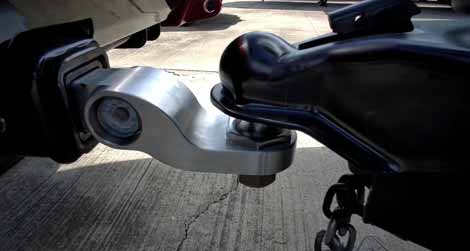
Towing a trailer can create more wind resistance, affecting your fuel economy. To save money on gas, try to keep the trailer as light as possible.
03. Keep a Safe Following Distance:
It’s crucial to maintain a safe following distance when towing a trailer. This will give you more time to stop if the trailer sway.
04. Use the Proper Turn Signals:
When making a turn, it’s essential to use the proper turn signals. Failure to do so can result in an accident. It is also important to come to a complete stop before making a turn.
05. Come to a Complete Stop Before Making a Turn:
Before making a turn, it’s essential to come to a complete stop. This will help prevent the trailer from swaying.
06. Use Caution When Backing Up:
Backing up a trailer can be tricky. It’s important to use caution and go slowly. Remember to keep an eye on your surroundings.
07. Watch for Oversteer:
When towing a trailer, it’s important to watch for oversteer. Oversteer can occur when the trailer starts to swing out from behind the vehicle. This can cause the vehicle to lose control and potentially crash.
08. Use Caution on Curves:
When towing a trailer, it’s essential to use caution on curves. The trailer can swing out on a turn and cause the vehicle to lose control.
You can help prevent accidents when towing a trailer by following these tips. Also, maintaining a safe following distance can help you avoid costly repairs if the trailer starts to sway.
Frequently Asked Questions (FAQs)
When towing a trailer, it is important to be aware of the potential problems. Keep in mind that maintaining a safe following distance is essential when towing a trailer, as this will give you more time to stop if the trailer starts to sway.
To learn more about towing a trailer, please see the frequently asked questions (FAQs) below:
01. What Happens If Tongue Weight Is Too Heavy?
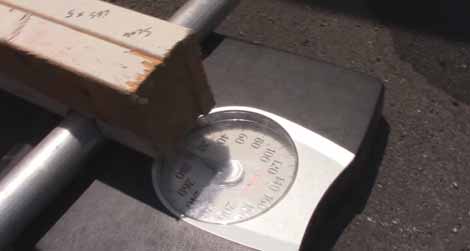
If the tongue weight is too heavy, it can cause the trailer to sway and the vehicle to lose control. If the tongue weight is excessive, the driver may struggle to maintain control of the vehicle, and the trailer may sway. This can lead to an accident.
02. Is 20% Tongue Weight too Much?
It is best to consult with the trailer manufacturer to determine the safe tongue weight. While 20% is within the safe range, it may be too heavy for some trailers.
03. Can Tongue Weight be Adjusted?
Tongue weight can be adjusted by moving the weight towards the back or towards the front of the trailer. Ten to fifteen percent of the gross trailer weight should be the tongue weight.
04. Does a Weight Distribution Hitch Reduce Tongue Weight?
Weight distribution hitches will not result in a reduction in tongue weight. These hitches are designed to help distribute the weight evenly between the trailer and the vehicle. This can help reduce tongue weight and help prevent damage to the vehicle and trailer.
05. How Much Hitch Weight Can My Truck Handle?
This will depend on the make and model of your truck. It is best to consult with the manufacturer’s guide to determine the maximum hitch weight that your truck can safely handle.
In Conclusion
It’s important to know what you need for your trailer to tow safely. From making proper adjustments to the height of a hitch ball or where an axle is placed on a vehicle, it can be easy to ensure that tongue weight isn’t affecting your car and its performance while driving.
Towing a trailer can be tricky without knowing how to reduce tongue weight on a trailer. But by following the tips we’ve provided, you can help prevent accidents and damage. With proper techniques, you can tow your trailer safely and without incident.
By using proper techniques and being aware of potential problems, you can be towing a trailer with ease. Thanks for reading!
